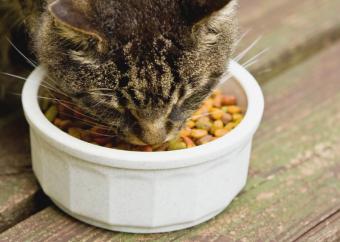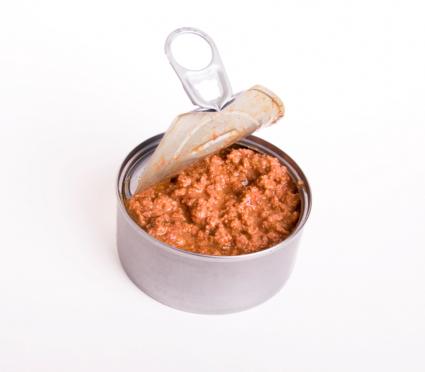
Finding the best diet for cats is one of the best things you can do to help your pet live a longer, healthier life. There are numerous cat diets available, and some are better and safer than others. Wading through the major options can help you understand your pet's nutritional needs and identify the best food to feed him.
Nutrients Cats Need Most in a Healthy Diet
According to the DVM360, cats are obligate carnivores. This means that they need the nutrients found in animal tissues to meet their nutritional needs. In the wild, a cat's main sources of protein are prey animals such as mice, rats, and birds. As house pets, they depend on a commercial diet that uses an animal-based protein formula.
Protein
This nutrient is one of the most important components in a cat's diet. Proteins supply amino acids needed to build tissue. A cat's system can manufacture 12 of the 23 essential amino acids he needs. The other 11 must come from consuming animal protein.
Fats
Fats certainly deliver flavor, but they also help cats absorb fat-soluble vitamins. Additionally, they supply some essential fatty acids and help keep a cat's skin and fur healthy.
Carbohydrates
These nutrients are mainly supplied from plants and vegetables, such as those that would be found in the stomachs of prey animals in a feral cat's diet. Carbs supply energy, and since cats are very efficient at digesting these nutrients, a low-carb diet is sufficient for them.
Vitamins
Cats require certain vitamins, like vitamin A and various B vitamins, because they can't manufacture them on their own. Vitamins are also needed to support many of the body's normal chemical reactions.
Minerals
Minerals also support chemical reactions in a cat's body, as well as help develop strong bones and teeth.
The Need for Water
All living creatures need water, and cats are no exception. According to the American Society for the Prevention of Cruelty to Animals (ASPCA), "Water accounts for between 60 to 70 percent of an adult cat's body weight." Being properly hydrated is important for a cat's normal body functions, so fresh water should be available at all times. Cats also get a certain amount of moisture from the foods they eat, but the amount varies according to whether they are fed a dry or moist diet.
A Balanced, Commercial Diet
Commercial cat food has been developed to meet your cat's nutritional needs. This makes it the ideal diet for your pet. Furthermore, you should choose the formula that most closely matches your cat's current life stage. You can use the classifications set forth at the American Animal Hospital Association (AAHA) as a guideline.
Comparison of Wet, Semi-Moist, and Dry Diets
As long as a product is labeled balanced, wet, semi-moist, and dry formulas are all acceptable for cats. Since cats tend to get a lot of their moisture from their food, wet/canned food can be an especially good choice since it has the highest water content. However, all three types of food are fine as long as you keep fresh water available at all times.
Wet Food

Wet food, according to Web MD, typically contains about 78 percent water, and it tends to have more animal protein and fat than dry food.
Dry Food
Dry food, also according to Web MD, typically contains up to 10 percent water, and it tends to have more carbs and less protein than wet food.
Semi-Moist Food
Semi-moist food, according to the FHC, typically contains about 35 percent water, and meat and meat by-products are the prime ingredients.
Medical Diets That Address Health Issues
Certain medical conditions, such as diabetes, kidney disease, and skin allergies, require special diets to help manage symptoms. A vet may provide directions or a recipe for a homemade diet, but you may also be instructed to purchase a commercial, medically-approved diet. For example:
- Royal Canin makes a Feline Urinary SO canned diet for cats that have urinary tract issues like infections and stones.
- Hill's Prescription Diet y/d Feline is formulated to support thyroid health.
Never put your pet on a medical diet without prior approval from your veterinarian.
Why Homemade Diets Aren't Necessarily Ideal
Although a homemade diet may see like a good idea if you want to avoid chemical additives that are used in some commercial cat foods, it may not be ideal. According to the FHC, a homemade diet may not have the right balance of nutrients to be beneficial for cats. They recommend that unless owners use a recipe provided to them by a veterinarian, such as a specialized medical diet, it's best to use a commercial cat food product that is nutritionally balanced.
Concerns About Raw Food Diets for Cats
The AAHA states they do not advocate feeding pets a raw food diet. Their reasons include:
- Raw meats may contain pathogens that are harmful to pets and people.
- Dogs fed raw meat can shed pathogens in their stools. (So it's possible a cat could too.)
- Many of these pathogenic organisms are resistant to antimicrobials, which are designed to kill microorganisms or at least inhibit their growth.
If you're still interested in feeding your cat a raw diet, ask your vet for his opinion on the subject.
Other Foods to Avoid Feeding Cats
In addition to avoiding raw meat, the ASPCA advises that cats should never be fed raw eggs. The whites contain avidin, which prevents cats from metabolizing fats, glucose, and amino acids.
PetCoach also advises against letting your cat ingest a wide variety of foods and other substances that may be easy to get hold of. These items include, but are not limited to:
- Onions and garlic - These foods contain substances that can damage red blood cells.
- Baby food - Some jars contain onion powder.
- Macadamia nuts - They contain a substance that affects the nervous and digestive systems.
- Grapes, raisins, and currants - These contain toxins which can affect the kidneys.
- Milk and dairy products - These items may cause diarrhea.
- Mushrooms - Mushrooms may contain toxins that can kill or make a cat very sick.
- Dog food - Dog food is formulated to meet a dog's nutritional needs, and feeding a cat this diet on a daily basis will eventually result in malnutrition.
Why Vegetarian/Vegan Diets Aren't Appropriate for Cats
As noted previously by VMRCVM, cats need protein derived from animal tissue. While it's true that some vegetables, as well as other food sources, do offer protein content, a cat's digestive system isn't designed to digest and metabolize these foods the way a human can. Therefore, a vegetarian or vegan diet isn't suitable for felines.
Furthermore, according to the ASPCA, taurine is an essential amino acid that ensures the normal function of a cat's eyes, cardiovascular system and reproductive system, and it's found exclusively in animal tissue. Cats can't synthesize taurine, so this is another reason cats need to eat a diet based on animal protein rather than a vegetarian/vegan diet.
Dealing With Your Cat's Weight Issues
The amount of food your cat needs on a daily basis depends on his activity level as well as any health issues he may have. It's usually best to begin by following the feeding guidelines on the product package, and then adjust the amount according to your cat's condition. Feeding an inactive cat too much food will lead to obesity. On the other hand, feeding a very active cat too little food can make him too skinny and lead to malnutrition.

It's important to consult your vet first if your cat has any type of weight issue, but the following common-sense advice will give you a good idea how to address any problems.
Obese Cats
For an obese cat, cut back the daily food ration by about one or two tablespoons, and keep a close eye to see how much weight he loses. When he reaches optimum weight, feed him just enough each day to maintain it. You can also encourage him to be more active by playing with him using a laser mouse, pole toy, or something else he enjoys.
Underweight Cats
For an underweight cat, increase the daily food ration by about two tablespoons, and keep track of his weight to make sure he begins to gain. When he reaches optimum weight, feed just enough food to maintain it. If this small adjustment doesn't help him gain, definitely consult your vet.
Dealing With a Picky Eater
In general, cats tend to eat in small amounts throughout the day, so a cat that may appear to be a picky eater could just be spreading his meal out over the entire day. A truly picky eater practically ignores his food. There are several ways to address a picky eater, but this is another case where you should consult your vet first to make sure your cat's lack of appetite isn't due to an undiagnosed illness. If the vet says your pet is in good health, try the following suggestions.
- Offer a variety of foods to keep your cat from becoming bored with his meals. Try rotating different flavor blends of dry and wet foods. Just like people, some cats don't want to eat the same meal day after day.
- Try moistening dry food with a little low-fat, low-sodium chicken broth. The extra moisture is good for your cat's system, and the broth adds a touch of tempting flavor.
Discuss Your Cat's Diet With Your Veterinarian
Your veterinarian is uniquely qualified to help you choose the right diet for your cat. Ask for recommendations on which brands/formulas deliver the best nutrition for your pet's age and current health. While premium cat foods do cost more than grocery store brands, feeding a top-quality diet may help you save on other veterinary costs down the road. All things considered, it's a wise investment.







